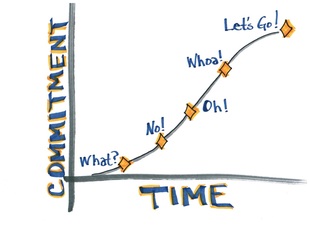From Business Insider: 11 Things you'll regret in your 30s
What better way to learn than from those who have been there and done that? A Reddit thread recently had people chiming in on things they regret doing (or not doing) in their 30s. Whether you are about to embark on the exciting journey of your 30s or nearing the tail end, learn from those in the know.
1. The shoulds
You'll feel societal pressures in your 30s more than ever before, but don't let the shoulds hold it back. You may constantly worry about how you should own a home, you should have kids, you should be married, or you should have a steady career. Drop all those expectations, and live life the way that makes you the happiest. Don't feel like a failure just because your life happens to deviate from the norm — you've got one life to live, so live it your way.
2. Not spending time with parents
One common regret that many people in their 30s have is not spending time with their parents while they are young enough to actively participate. Simple pleasures like taking a walk, traveling, or even having a conversation may be harder to come by once your parents age.
3. Putting work first
Something to keep in your mind in your 30s: if you put work first, you're going to regret it. Spend time with people you love, because those are precious moments that money and moving up the ladder can't beat.
4. Spending time on negativity
And you thought those negative people would disappear from your life in your 30s. Nope, there may be some hanging around, so don't waste time on them. Watch out for people who don't make you feel good about yourself, and reevaluate your relationships with them. Be careful of spending time on negative thoughts and issues that you have no control over. Just. Let. It. Go.
5. Thinking your 30s was old
"I'm too old for this!" may be a common phrase you use in your 30s. You know what? You're not. And I bet people in their 50s and 60s will agree. The world was your oyster in your 20s, and it still is. Take a chance, live, and enjoy life as the young'un you are, and never lose that child in you.
6. Not putting yourself first
Maybe you're putting everyone else first in your life but you. Snap out of it! Know that once you put yourself first, everything else can fall into place. Putting your needs first will make you a happy camper, which will result in better relationships — a win-win. When you take care of yourself, you'll have fewer regrets in your 30s. The partner your life revolved around? You probably won't regret that as much if you had focused on your needs and chased your dreams as well.
7. Not taking better care of your body
It's quite the paradox — you say you're too old for something, and yet you still keep the junk-food-fueled and antiexercise habits of the younger you. Those habits are harder to drop, but treat your body right early, or it'll catch up with you before you know it.
8. Not taking chances
Maybe you're overly cautious at this age and perhaps it's the shoulds we mentioned earlier that are holding you back. Don't play it safe, and live a little.
9. Not saving and investing enough
This seems to be a huge, huge regret that a lot of 30-year-olds carry. If you start saving earlier, you'll be reaping bigger rewards by the time you retire. And if you don't put off saving and investing in your 30s, you'll be more likely to retire at the age you want.
10. Not traveling enough
The world is at your fingertips, so take off on a travel adventure! Don't keep procrastinating and putting this off — it'll be harder to make time for travel as you get older. Get inspired by this list of the 10 most beautiful travel adventures.
11. Caring too much about what others think
It seems we're guilty of this at every age. Don't waste more time on this useless habit in your 30s. Stop investing time and energy into caring about what people who don't care about you think. The ones who do care for you will accept you as you are.
1. The shoulds
You'll feel societal pressures in your 30s more than ever before, but don't let the shoulds hold it back. You may constantly worry about how you should own a home, you should have kids, you should be married, or you should have a steady career. Drop all those expectations, and live life the way that makes you the happiest. Don't feel like a failure just because your life happens to deviate from the norm — you've got one life to live, so live it your way.
2. Not spending time with parents
One common regret that many people in their 30s have is not spending time with their parents while they are young enough to actively participate. Simple pleasures like taking a walk, traveling, or even having a conversation may be harder to come by once your parents age.
3. Putting work first
Something to keep in your mind in your 30s: if you put work first, you're going to regret it. Spend time with people you love, because those are precious moments that money and moving up the ladder can't beat.
4. Spending time on negativity
And you thought those negative people would disappear from your life in your 30s. Nope, there may be some hanging around, so don't waste time on them. Watch out for people who don't make you feel good about yourself, and reevaluate your relationships with them. Be careful of spending time on negative thoughts and issues that you have no control over. Just. Let. It. Go.
5. Thinking your 30s was old
"I'm too old for this!" may be a common phrase you use in your 30s. You know what? You're not. And I bet people in their 50s and 60s will agree. The world was your oyster in your 20s, and it still is. Take a chance, live, and enjoy life as the young'un you are, and never lose that child in you.
6. Not putting yourself first
Maybe you're putting everyone else first in your life but you. Snap out of it! Know that once you put yourself first, everything else can fall into place. Putting your needs first will make you a happy camper, which will result in better relationships — a win-win. When you take care of yourself, you'll have fewer regrets in your 30s. The partner your life revolved around? You probably won't regret that as much if you had focused on your needs and chased your dreams as well.
7. Not taking better care of your body
It's quite the paradox — you say you're too old for something, and yet you still keep the junk-food-fueled and antiexercise habits of the younger you. Those habits are harder to drop, but treat your body right early, or it'll catch up with you before you know it.
8. Not taking chances
Maybe you're overly cautious at this age and perhaps it's the shoulds we mentioned earlier that are holding you back. Don't play it safe, and live a little.
9. Not saving and investing enough
This seems to be a huge, huge regret that a lot of 30-year-olds carry. If you start saving earlier, you'll be reaping bigger rewards by the time you retire. And if you don't put off saving and investing in your 30s, you'll be more likely to retire at the age you want.
10. Not traveling enough
The world is at your fingertips, so take off on a travel adventure! Don't keep procrastinating and putting this off — it'll be harder to make time for travel as you get older. Get inspired by this list of the 10 most beautiful travel adventures.
11. Caring too much about what others think
It seems we're guilty of this at every age. Don't waste more time on this useless habit in your 30s. Stop investing time and energy into caring about what people who don't care about you think. The ones who do care for you will accept you as you are.

 RSS Feed
RSS Feed